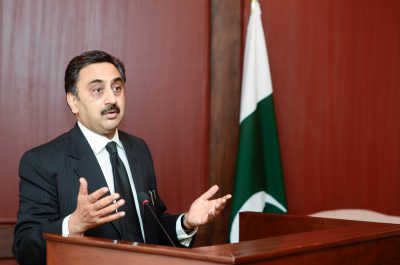
Pakistan Institute for Parliamentary Services organized seminar cum consultative session on “Revisiting Indus Waters Treaty” on May 18, 2016 at PIPS main campus Islamabad. In lieu of Pakistan’s water woes, the seminar culminated on the personal initiative of the Honorable Senator Karim Ahmed Khawaja, who wanted to get input from field experts and multiple stakeholders on the highly pertinent Indus Waters Treaty.
Prime target audience for the seminar was the Honorable Members of Senate and National Assembly Committees on Water and Power. Chaired by Honorable Senator Karim Ahmed Khawaja, the one-day event was attended by 35 participants including; Senator Farhat-Ullah Babar, Senator Afrasiab Khattak, Senator Taj Haider, Senator Nihal Hashmi, Senator Gianchand, Senator Ghous Mohammad Khan Niazi, MNA Shehryar Afridi, concerned Officials from Ministry of Foreign Affairs, Ministry of Law, Ministry of Water and Power, WAPDA, IRSA, Union representative Mr. Mohmmad Ali Shah Fisher Folk Forum, faculty members from NIPS, QAU, and former Federal Secretary Planning Division, Mr. Fazal-Ullah Qureshi.
The event began with the recitation of verses from the Holy Quran, followed by welcome Speech by Acting Executive Director PIPS, Mr. Muhammad Rashid Mafzool Zaka. He paid tribute to Honorable Senator Karim Khawaja for providing impetus to organize the event on this pertinent issue as well as the current Parliamentary leadership in Pakistan for their support they have always extended towards PIPS for bridging gap between parliament and the public at large. Providing rich statistics on Pakistan’s water scenario, Mr. Rao Irshad Ali Khan, Chairman Indus River System Authority (IRSA) led the session on ‘National Context of Indus Waters Treaty.’ Among various recommendations, he highlighted the importance of building reservoirs to fulfill the needs of the smaller provinces.
Former Federal Minister for Law, Mr. Ahmer Bilal Soofi, led the session on the ‘International Perspectives on Indus Waters Treaty.’ He underscored the two potential approaches for revisiting the Indus Waters Treaty including: one revisit the treaty to reopen the treaty, two, revisit the treaty for improved interpretation. Expressing his support for the second approach the eminent lawyer advocated the need to “revisit the treaty to innovatively interpret it in the modern context.” In this regard, he mentioned few aspects over which the revisiting can be executed. For example, while the treaty has remain frozen for years, the international water law relating to upper and lower riparian has progressed in past few decades. The developments in the international environmental law provides with obvious example. Furthermore, on the basis of the international environmental law Pakistan can make a claim with India against the drying out of our plains by blocking water from the eastern rivers. Also, he coined the idea to take stock of state practices in South Asia relating to upper and lower riparian states.
Presenting the situation analysis, Mr. Izharul Haq, Advisor WAPDA, endorsed the idea to revisit the treaty in terms of interpretation rather than it’s reopening. He also highlighted the influence of Indian lobbies at international level that often create difficulties for Pakistan in meeting at water challenges. Dr. Shoaib Ahmed, Consultant Ministry of Law, added an academic perspective to the ongoing debate. He emphasized the need to take water security, meaning the ability to access sufficient quantity of clean water, as a national narrative.
Ms. Aasiya Riaz, Joint Director PILDAT, speaking on the ‘Pros and Cons of Indus Waters Treaty for Pakistan’ commended the initiative of the Senate of Pakistan to revisit the Indus Waters Treaty. As a way forward among others she suggested the construction of more reservoirs and replacement of capacity lost due to silting and putting in place holistic water conservation policies and practices. An interactive Q&A session followed the individual presentations in which the participants deliberated on a number of inter-related issues pertaining to the Indus Waters Treaty. Session Chair Senator Karim Ahmed Khawaja presented vote of thanks at the end of the event, which was an effort of the PIPS Legislation Wing.